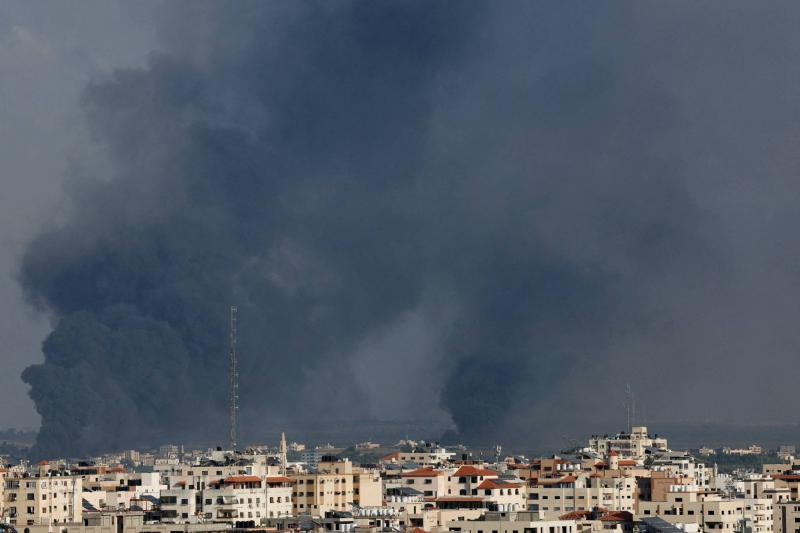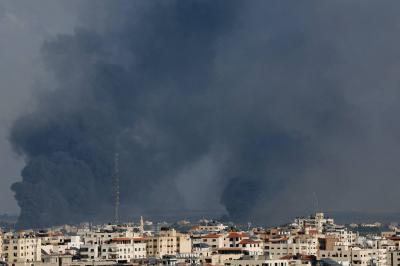The war between Israel and Hamas erupted after the militant group stormed Israeli towns and communities near the Gaza border in a surprise attack on October 7. This war is the latest in a conflict that has lasted for seven decades between Israelis and Palestinians, leading to instability in the Middle East.
#### What is the Origin of the Conflict?
The intractable conflict places Israeli demands for security, in a region that they have long viewed as hostile, against Palestinian aspirations for statehood. Hamas rejects the two-state solution and has pledged to destroy Israel. The United Nations General Assembly approved a plan in 1947 to partition Palestine into Arab and Jewish states and to impose international governance on Jerusalem. Jewish leaders accepted the plan, which allocated them 56% of the land of Palestine. The Arab League rejected this proposal.
The founding father of Israel, David Ben-Gurion, declared the modern State of Israel on May 14, 1948, establishing a safe haven for Jews fleeing persecution and wishing to create a national homeland in the land they claim deep historical ties to. However, violence escalated between Jews and Arabs, and forces from five Arab countries attacked Israel just one day after its establishment. In the war that followed the declaration of Israel, around 700,000 Palestinians, or half of the Arab population in Palestine then under British mandate, were either displaced from their homes or fled, ending up in Jordan, Lebanon, Syria, as well as in Gaza, the West Bank, and East Jerusalem. Palestinians refer to the establishment of the State of Israel as the Nakba, which led to their collective dispossession and dashed their hopes of statehood.
Ceasefire agreements halted the fighting in 1949, but there was no official peace. Today, Palestinians who remained after the war and their descendants make up about 20% of Israel's population.
#### What Major Wars Have Occurred Since Then?
In 1967, Israel launched a preemptive strike against Egypt and Syria, starting the Six-Day War. Israel captured the West Bank, East Jerusalem from Jordan, the Golan Heights from Syria, and the Gaza Strip from Egypt, occupying them ever since. An Israeli population estimate from that year noted that Gaza had a population of 394,000, with at least 60% being Palestinian refugees and their descendants.
On October 6, 1973, Egypt and Syria launched a surprise attack on Israeli positions along the Suez Canal and the Golan Heights. Israel pushed both armies back within three weeks. Israel invaded Lebanon in 1982, and thousands of Palestinian fighters led by Yasser Arafat were evacuated by sea after a ten-week siege. Israeli forces withdrew from Lebanon in 2000. In 2005, Israel unilaterally withdrew settlers and soldiers from Gaza, which it had captured from Egypt in 1967. Hamas won parliamentary elections in 2006 and took full control of the territory in 2007. Gaza has experienced significant escalations in combat between Palestinian militants and Israel in 2006, 2008, 2012, 2014, and 2021.
In 2006, Hezbollah fighters supported by Iran captured two Israeli soldiers in the troubled border area, prompting Israel to launch a military campaign that resulted in a six-week war. Besides the wars, there were two Palestinian intifadas, one between 1987 and 1993 and the second between 2000 and 2005. The latter saw waves of suicide bombings carried out by Hamas against Israelis and substantial Israeli air and artillery bombardments on Palestinian cities.
#### What Peace Efforts Have Taken Place?
In 1979, Egypt and Israel signed a peace treaty that ended 30 years of hostilities. In 1993, Israeli Prime Minister Yitzhak Rabin and Yasser Arafat, the leader of the Palestine Liberation Organization, shook hands within the Oslo Accords, granting Palestinians limited self-governance. In 1994, Israel signed a peace treaty with Jordan.
President Bill Clinton, Israeli Prime Minister Ehud Barak, and Arafat participated in the Camp David Summit in 2000, but they could not reach a final peace agreement. In 2002, the Arab League proposed a plan to Israel to establish normal relations with all Arab states in exchange for a complete withdrawal from the land occupied in the 1967 war, the creation of a Palestinian state, and a "just solution" for Palestinian refugees. However, Hamas detonated a hotel in Israel during Passover, overshadowing the plan.
Other peace efforts have stalled since 2014 when negotiations between Israelis and Palestinians failed in Washington. Palestinians refrained from engaging with President Donald Trump’s administration from 2017 to 2021, as it reversed long-standing U.S. policy by recognizing Jerusalem as Israel’s capital. Palestinians seek an independent state with East Jerusalem as its capital.
#### Where Do Peace Efforts Stand Now?
President Joe Biden’s administration has focused on trying to reach a "grand bargain" in the Middle East that includes normalizing relations between Israel and Saudi Arabia. The ongoing war has created a diplomatic embarrassment for Riyadh and other Arab states in the Gulf that have signed peace agreements with Israel.
#### What are the Main Israeli-Palestinian Issues?
At the heart of the conflict are issues related to the two-state solution, Israeli settlements in occupied territories, the status of Jerusalem, agreed borders, and the fate of Palestinian refugees.
The two-state solution entails an agreement to establish a state for Palestinians in the West Bank and Gaza alongside Israel. Hamas rejects this solution and is committed to destroying Israel. Israel asserts that the Palestinian state must be demilitarized to avoid jeopardizing its security.
Regarding settlements, most countries consider the Jewish settlements established on land occupied by Israel in 1967 to be illegal. Israel disputes this, citing historical and biblical ties to these lands. The ongoing expansion of settlements remains one of the most contentious issues between Israel, Palestinians, and the international community.
With respect to Jerusalem, Palestinians want East Jerusalem, which contains sites of significant religious importance to Muslims, Jews, and Christians, to be the capital of their state. Israel insists that Jerusalem should remain its "eternal and indivisible" capital. Israel's claim to East Jerusalem lacks international recognition. Trump recognized Jerusalem as Israel’s capital without specifying the scope of its jurisdiction over the disputed city and moved the U.S. embassy there in 2018.
Concerning refugees, today around 5.6 million Palestinian refugees, most of whom are descendants of those who fled in 1948, live in Jordan, Lebanon, Syria, the Israeli-occupied West Bank, and Gaza. The Palestinian Ministry of Foreign Affairs states that around half of registered refugees remain stateless, many living in overcrowded camps. Palestinians have long demanded the right for refugees and millions of their descendants to return, while Israel contends that any resettlement of Palestinian refugees must occur outside its borders.




